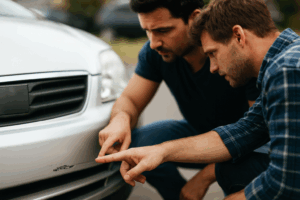
If you were in a Texas auto accident, you might find yourself dealing with an insurance adjuster at some point. The best course of action is to let a personal injury attorney guide you through any and all correspondence. That’s because many things can go wrong during a discussion with the adjuster.
Every year, auto accident injuries are on the rise in Texas. If you or a family member were injured due to someone else’s negligent behavior, give us a call today. We will use our free consultation to fill you in on your legal rights and options.

An adjuster can and will use the things you say against you. The hours and days following a crash can be confusing, hectic, and stressful. If you say something to indicate fault, the adjuster can use this to prove you are responsible for injuries and damages. Even something as simple as “I’m sorry” can negatively impact the outcome when dealing with an insurance adjuster.
Your admission of fault, or perceived admission of guilt, is an easy reason for an insurance adjuster to deny your claim. That’s why it’s always best to consult an attorney before you talk to an adjuster, whether in-person or on the phone.
Stick to the facts that you know. Avoid attempting to fill in gaps or speculate on what might have transpired. Speculating about the accident can potentially harm your claim.
It might seem innocuous to fill in the gaps with what you believe might have happened, but any speculation on your part is likely to be used against you by the insurance company. Stick to providing factual information that you are certain of and do not venture into hypotheticals or conjecture.
Remember, the adjuster’s role includes investigating the accident, so let them do that job. If you don’t know or can’t remember certain details, it is perfectly fine to say so. It’s preferable to be honest about what you don’t know than to speculate and risk misrepresenting what actually happened.
It may be tempting to believe that informal or “off-the-record” comments to an insurance adjuster will not impact your claim. However, it’s essential to remember that there is no such thing as “off-the-record” in these situations. Anything you say to the adjuster can be used as part of their claim evaluation. You should always assume that all conversations are being recorded and can be used against your claim.
In light of this, it is crucial to maintain professionalism and stick to the facts of the incident at all times when interacting with an adjuster. Notably, avoid making casual or offhand remarks about the accident or your injuries, as these comments can be misconstrued and used against you.
While it might sound harmless enough to give an adjuster access to your medical history, doing so can cause problems. An adjuster can argue that your medical history suggests pre-existing conditions or that your injuries are unrelated to your accident.
Auto accident victims should always be careful when dealing with an insurance adjuster and signing a medical release. A skilled car crash lawyer can guide you every step of the way so you don’t sabotage your claim and lose out on compensation.
Discussing your injuries in detail when dealing with an insurance adjuster may seem like the right thing to do; after all, they need to understand the extent of your injuries to evaluate your claim, right? However, it’s crucial to avoid getting into details about your injuries, especially soon after the accident. This is because your understanding and the full scope of your injuries can evolve as doctors continue to diagnose and treat you.
Some injuries may not manifest symptoms right away, or the full impact of your injuries on your day-to-day life may not be immediately apparent. Instead, let your attorney handle these discussions with the insurance company. This will ensure that your claim accurately reflects the full extent of the damage and the impact on your life, potentially leading to a more equitable settlement.
One common mistake that car crash victims make when dealing with an insurance adjuster is agreeing to the first settlement offer. As with any negotiation, the first offer is almost always a bare minimum. Insurance companies do not want to pay out on large claims, so they tend to minimize what they are willing to pay, if anything.
While it might be tempting to take any amount of money, accepting an offer out of desperation is never a good idea. With a personal injury lawyer at your side, you can maximize your settlement, reject lowball offers, and get the compensation you deserve.
Giving a statement about your accident or injuries might seem straightforward when dealing with an insurance adjuster. Unfortunately, comments can get away from people and quickly get them in trouble. In your stress or confusion, you might say something that makes your injuries sound less severe. Or, you might make a statement that sounds like you are admitting fault.
The best course of action is to consult with an attorney before giving any kind of recorded statement. Thompson Law personal injury lawyers have years of experience helping victims prepare for discussions. Together, we can ensure the best possible outcome for your case.
Discussing a recent car crash can unleash many emotions. When people are injured and stressed, it is understandable that they might become angry, frustrated, or impatient. Unfortunately, getting aggressive with an insurance adjuster or badmouthing the other driver won’t win you any points.
Statements made in anger can ruin your claim. If you are angry and cannot control your emotions, the adjuster will believe that jurors would find you to be an unsympathetic witness at trial. But an auto accident lawyer will help you mentally and emotionally prepare for each step of the process. Using their knowledge and expertise, your attorney will help you anticipate potential challenges, obstacles, and difficulties along the way.
Limit your responses to only what is directly asked. Volunteering extra information might seem benign, but it can inadvertently complicate your claim. Adjusters are trained to seek out information that can minimize the company’s liability.
By giving more details than necessary, you could unintentionally provide ammunition for them to reduce the compensation you receive. Answer questions succinctly and stick to the facts. Avoid elaborating or sharing information that wasn’t specifically requested. Your attorney can guide you on how to handle these interactions to protect your claim effectively.
The insurance adjuster is primarily a negotiator working on behalf of the insurance company. Their main objective is to settle claims for the lowest amount possible, ensuring minimal financial impact on the insurer. While they might seem empathetic or supportive during your conversations, this is a tactic to build trust and encourage you to settle quickly and for less than you might deserve.
Keep in mind that their allegiance lies with the insurance company, not with you. Any advice or reassurance they offer is aimed at advancing their employer’s interests. This is why having your own attorney is so crucial. Your attorney’s sole focus is to advocate for your best interests, ensuring you receive fair compensation for your injuries and losses. Always approach interactions with an insurance adjuster with caution and consult with your lawyer before making any decisions or providing statements.
After a car crash, insurance adjusters are responsible for the following:
Like everyone else, insurance adjusters are just doing their job. But it is important to remember when dealing with an insurance adjuster that they work for the insurance company. As such, adjusters might have a motive to delay, minimize, or deny your claim. An auto accident attorney has years of experience dealing with insurance adjusters, and they know how to avoid common mistakes.
There are many things you should not say to an insurance adjuster. For this reason, it is always best to hire a personal injury attorney who can guide you through every step of the process. Car accident cases can be complex, even when the situation seems straightforward and obvious to the victim. Don’t allow one simple mistake to derail your claim.
If another driver’s negligence caused your injuries, you are not stuck with outrageous medical bills and expenses. Our auto accident attorneys will work toward a fair settlement that compensates for medical bills, pain and suffering, and lost wages.
Call us today for a free consultation so we can discuss your legal rights and options. There’s no fee unless we win.

It’s best to avoid discussing your pain directly with the insurance adjuster, especially soon after the accident. Your medical condition may change, and your injury evaluations could evolve. Always refer medical questions to your attorney, who can communicate accurately on your behalf.
Typically, an insurance adjuster will contact you within a few days of the accident. They will want to gather initial information from you quickly, while the details are fresh. Remember, you are not obligated to provide a detailed statement immediately; consult with your attorney first.
Despite their demeanor, remember that insurance adjusters work for the insurance company and their goal is to minimize payouts. Treat any conversation with professionalism and refer to your attorney for guidance to ensure your best interests are protected.
You absolutely have the right to negotiate the settlement amount. Often, the initial offer will be lower than what you may be entitled to. An experienced personal injury lawyer can help you understand the true value of your claim and negotiate for a fair settlement.
If you liked this article about dealing with an insurance adjuster, you might also like:






Thompson Law charges NO FEE unless we obtain a settlement for your case. We’ve put over $1.9 billion in cash settlements in our clients’ pockets. Contact us today for a free, no-obligation consultation to discuss your accident, get your questions answered, and understand your legal options.
State law limits the time you have to file a claim after an injury accident, so call today.